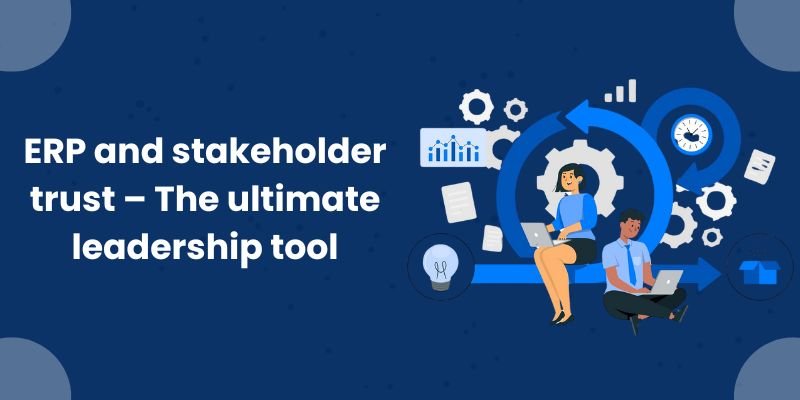In the landscape of modern education, stakeholder trust is no longer a by-product of reputation—it is an active and ongoing responsibility. Parents, students, teachers, staff, alumni, and governing boards all rely on institutional leadership to be transparent, efficient, and responsive. For schools to thrive in this environment, the right digital tools are essential.
Enter the Education ERP system.
While many school leaders view ERP platforms primarily as operational tools, their true value extends far deeper. A thoughtfully implemented ERP becomes a strategic asset—one that builds and sustains stakeholder trust across every level of an institution.
Trust and School Leadership: An Inseparable Pair
Trust is what keeps educational communities intact during times of change or crisis. It’s the glue that holds together parents’ belief in the school’s vision, teachers’ confidence in administrative processes, and students’ sense of being seen and supported.
But trust isn’t built on lofty ideals alone. It’s cultivated through consistency, transparency, and reliability. This is where school ERP systems come in—by reinforcing these values through technology.
The Role of ERP in Building Transparency
One of the most critical aspects of trust is transparency. When stakeholders can see what’s happening—and understand why—confidence naturally grows. An ERP system allows schools to:
- Digitally document and share grades, attendance, and academic performance
- Provide real-time updates to parents and students through secure portals
- Track fees, assignments, circulars, and schedules without manual dependencies
This kind of visibility gives families peace of mind. Parents no longer have to rely on second-hand information. Teachers don’t need to manually update multiple platforms. Students can access accurate timelines for their academic responsibilities.
For school leaders, this creates a robust framework where accountability and transparency are baked into every process.
Data-Driven Decision Making = Fairness + Confidence
Stakeholder trust in education is reinforced when decisions—big or small—are based on data and not assumptions. ERP platforms allow school leadership to analyze real-time insights, whether it’s around student performance trends, teacher workloads, or resource allocation.
This enables:
- Fairer staff evaluations backed by performance metrics
- Early identification of students who need additional support
- Smarter budget and facility management
- Better planning of class sizes and subject offerings
With a centralized system, everyone—from the school board to classroom teachers—can operate from a single source of truth. This prevents miscommunication and fosters an environment of consistency and equity.
Enhancing Parent Engagement Through ERP
Parents are one of the most invested stakeholder groups in any educational institution. But they often feel excluded or under-informed when communication is limited to periodic PTMs or newsletters. ERP platforms empower schools to change that dynamic.
Using parent portals, SMS notifications, and app-based updates, schools can:
- Keep families informed in real time
- Enable two-way communication between teachers and parents
- Provide visibility into academic progress, attendance, and behavioural updates
This constant connection makes parents feel included, respected, and assured that the institution has their child’s best interest at heart. That’s a foundation for long-term trust.
Empowering Teachers and Non-Academic Staff
Stakeholder trust must also extend inward. Teachers and staff need to feel valued and supported by leadership. ERP systems reduce administrative burden and offer clarity around roles, schedules, expectations, and evaluations.
Some key ERP benefits for staff include:
- Automated attendance and grading tools
- Access to student analytics for tailored teaching
- Digital record keeping for workload management
- Performance dashboards for fairer appraisals
This transparency boosts morale and promotes a workplace culture where decisions are justified and contributions are visible.
ERP for Strategic Governance and Board Alignment
School boards and institutional leaders rely heavily on documentation, compliance, and data integrity. Without a structured system, generating reports and ensuring alignment with academic goals becomes tedious and error-prone.
An ERP offers powerful reporting tools and visual dashboards that help:
- Track academic results, enrolments, and finances
- Simplify audits and inspections
- Align institutional performance with strategic goals
This builds trust not just internally, but also with external bodies such as accreditation councils and education departments.
Data Security is Digital Trust
With increasing digital adoption in education, data security is no longer optional. Stakeholders need assurance that their personal and academic information is protected.
ERP systems designed for educational institutions prioritize:
- Role-based access controls
- Secure logins and password protocols
- Encrypted databases and cloud backups
- Digital audit trails for accountability
When schools invest in secure digital infrastructure, they signal seriousness about privacy, compliance, and long-term responsibility.
Implementation with Inclusion: A Trust-Centric Approach
An ERP system is only as good as its adoption. If staff are overwhelmed or parents confused, the tool can actually increase distrust. That’s why ERP implementation must be phased, inclusive, and well-supported.
Best practices for a trust-first implementation include:
- Conducting orientation sessions for staff and parents
- Providing hands-on training for teachers
- Communicating the goals and benefits of the system
- Encouraging user feedback and ongoing improvements
When ERP becomes a shared tool—not just a leadership imposition—it turns into a unifying force that aligns all stakeholders.
ERP as a Long-Term Trust Strategy
Unlike many technological tools that solve isolated problems, ERP systems create holistic change. By weaving transparency, efficiency, and consistency into the daily fabric of school life, they redefine how stakeholders experience the institution.
And in doing so, they serve as the ultimate leadership tool—quietly but powerfully enhancing trust at every touchpoint.
As schools and colleges face increasing pressure to be accountable, responsive, and inclusive, technology must play a supporting role. A robust education ERP platform is not just a means of digital transformation. It’s a catalyst for better leadership.
By streamlining communication, facilitating transparency, empowering staff, and securing sensitive data, ERP solutions help school leaders build an ecosystem of trust. And that trust, once established, becomes the most valuable currency an institution can hold.
ERP is no longer a nice-to-have. For school leadership that values integrity, clarity, and connection, it is the most powerful trust-building tool available.
